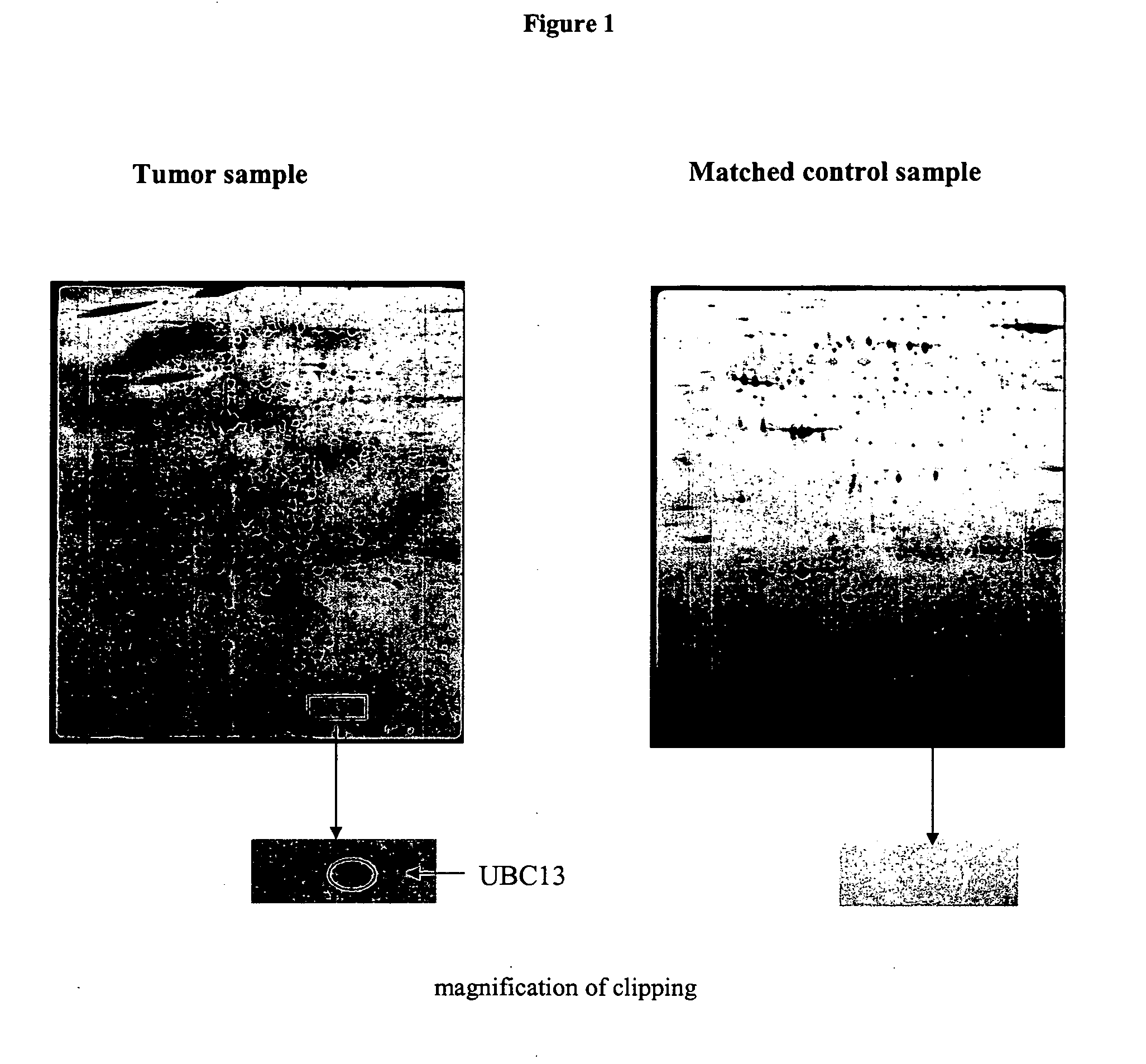Use of protein UBC13 as a marker for breast cancer
a breast cancer and protein technology, applied in the field of breast cancer diagnosis, can solve the problems of poor prognosis in the advanced stage of cancer, poor treatment effect, and high cost of mammography, and achieve the effect of improving the quality of life and reducing the risk of cancer
- Summary
- Abstract
- Description
- Claims
- Application Information
AI Technical Summary
Problems solved by technology
Method used
Image
Examples
specific embodiments
EXAMPLE 1
Identification of UBC13 as a Potential Breast Cancer Marker
Sources of Tissue
[0090] In order to identify tumor-specific proteins as potential diagnostic markers for breast cancer, analysis of two different kinds of tissue is performed using proteomics methods.
[0091] In total, tissue specimen from 14 patients suffering from breast cancer are analyzed. From each patient two different tissue types are collected from therapeutic resections: Tumor tissue (>80% tumor) (T), and adjacent healthy tissue (N). The latter tissue type serves as matched healthy control sample. Tissues are immediately snap frozen after resection and stored at −80° C. before processing. Tumors are diagnosed by histopathological criteria.
[0092] 0.8-1.2 g of frozen tissue are put into a mortar and completely frozen by liquid nitrogen. The tissue is pulverized in the mortar, dissolved in the 10-fold volume (w / v) of lysis buffer (40 mM Na-citrate, 5 mM MgCl2, 1% Genapol X-080, 0.02% Na...
example 2
Generation of Antibodies to the Breast Cancer Marker Protein UBC13
[0098] Polyclonal antibody to the breast cancer marker protein UBC13 is generated for further use of the antibody in the measurement of serum and plasma and blood levels of UBC13 by immunodetection assays, e.g. Western Blotting and ELISA
Recombinant Protein Expression and Purification
[0099] In order to generate antibodies to UBC13, recombinant expression of the protein is performed for obtaining immunogens. The expression is done applying a combination of the RTS 100 expression system and E. coli. In a first step, the DNA sequence is analyzed and recommendations for high yield cDNA silent mutational variants and respective PCR-primer sequences are obtained using the “ProteoExpert RTS E.coli HY” system. This is a commercial web-based service (www.proteoexpert.com). Using the recommended primer pairs, the “RTS 100 E. coli Linear Template Generation Set, His-tag” (Roche Diagnostics GmbH, Mannheim, Germany, Cat. No. 31...
example 3
Western Blot for the Detection of UBC13 in Human Serum and Plasma Samples
[0113] SDS-PAGE and Western Blotting are carried out using reagents and equipment of Invitrogen, Karlsruhe, Germany. Human plasma samples are diluted 1:20 in reducing NuPAGE® (Invitrogen) LDS sample buffer and heated for 5 min at 95° C. 10 μl aliquots are run on 4-12% NuPAGE® gels (Bis-Tris) in the MES running buffer system. The gel-separated protein mixture is blotted onto nitrocellulose membranes using the Invitrogen XCell II™ Blot Module (Invitrogen) and the NuPAGE® transfer buffer system. The membranes are washed 3 times in PBS / 0.05% Tween-20 and blocked with SuperBlock Blocking Buffer (Pierce Biotechnology, Inc., Rockford, Ill., USA). The biotinylated primary antibody is diluted in SuperBlock Blocking Buffer (0.01-0.2 μg / ml) and incubated with the membrane for 1 h. The membranes are washed 3 times in PBS / 0.05% Tween-20. The specifically bound biotinylated primary antibody is labeled with a streptavidin-HR...
PUM
 Login to View More
Login to View More Abstract
Description
Claims
Application Information
 Login to View More
Login to View More - R&D
- Intellectual Property
- Life Sciences
- Materials
- Tech Scout
- Unparalleled Data Quality
- Higher Quality Content
- 60% Fewer Hallucinations
Browse by: Latest US Patents, China's latest patents, Technical Efficacy Thesaurus, Application Domain, Technology Topic, Popular Technical Reports.
© 2025 PatSnap. All rights reserved.Legal|Privacy policy|Modern Slavery Act Transparency Statement|Sitemap|About US| Contact US: help@patsnap.com

